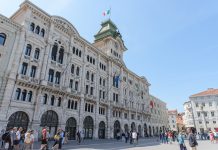by InTrieste
Interviews FVG councilor of infrastructure, Cristina Amirante
In a pioneering effort to promote sustainable, integrated mobility along the Adriatic coast, the Friuli Venezia Giulia region has announced the launch of a new cross-border Bike & Bus service connecting the city of Trieste with the picturesque Croatian town of Poreč (Parenzo). Starting Saturday, June 7, this innovative pilot project aims to offer cyclists and bike enthusiasts a seamless, free intermodal link between Trieste and the renowned Parenzana cycling route, a beloved trail that follows a historic railway line across the Istrian peninsula.
The initiative is part of Cyros—Cycling Routes for a Sustainable Adriatic-Ionian Mobility—a broader European Union-backed program funded by the Interreg Italy-Croatia 2021-2027 cooperation framework. Led by the Region of Friuli Venezia Giulia’s Infrastructure and Territory Department, Cyros envisions a long-term green corridor running along the Adriatic, designed to connect key cycling networks and foster active tourism while strengthening ties with Croatian partners.
“Intermodality is not just a technical choice, it’s a strategic vision,” said Cristina Amirante, the Regional Councillor for Infrastructure and Territory. “Through Cyros, we are planting the seeds for a new way of traveling along the Adriatic — one that is sustainable, integrated, and forward-looking.”
Amirante acknowledged ongoing concerns about disruptions related to complex infrastructure works on the regional railway network, which could impact the continuity of services and the development of cycling tourism. “We are committed to close cooperation with Italy’s national rail operator RFI and other stakeholders to ensure every infrastructure project is carefully coordinated within the broader, interconnected national railway system,” she added.
She also highlighted the need for careful planning in less redundant lines such as Udine-Tarvisio, where construction scheduling must balance safety and the long-term resilience of the railway system. “Temporary inconveniences are never taken lightly but must be seen as necessary investments in improving mobility quality,” Amirante said. “We will continue to strive for a more accessible and sustainable transportation system, enhancing connections between rail and bike paths, always in dialogue with local communities and with a view toward slow and responsible tourism.”
Operated by Udine-based company Cogoi, the Bike & Bus service will run every weekend from June 7, 2024, to November 2, 2025. Departure from Trieste’s bus terminal is scheduled at 2 p.m., with the return trip leaving Poreč at 6 p.m. Two intermediate stops will be made on request: Rabuiese (near the urban stops on via Laghetti/via Colombara Vignano) and Plovania (in Croatia). Thanks to funding from the European Regional Development Fund (80%) and the Italian government (20%), the service will be free and reservations can be made via the dedicated “Tratte Speciali in Bus” website.
Cyros aims to contribute significantly to defining the Adriatic-Ionian cycling itinerary by enhancing intermodal travel options and forging new connections between coastal and inland cycling networks. Launched in March 2024, the 30-month project carries a total budget of €2.75 million, of which €400,000 is allocated to the Friuli Venezia Giulia region.
In addition to the Bike & Bus link, Cyros includes plans to revise and update the FVG2/b Carso cycling route for future comprehensive design, explore new intermodal connections between the Parenzana trail and regional ports and transport hubs, and organize a series of cross-border technical and training events to share best practices in cycling mobility planning.
The project consortium spans several Italian and Croatian regions and entities, including Puglia, Abruzzo, Marche, the Itl Foundation, Istria, and the Croatian counties of Primorje-Gorski Kotar and Dubrovnik-Neretva — underscoring the strong European and cooperative dimension of this ambitious initiative.
As tourism increasingly embraces eco-friendly options, the Trieste-Poreč Bike & Bus service offers a promising model for connecting communities and encouraging a greener, healthier way to explore the Adriatic coast.






























